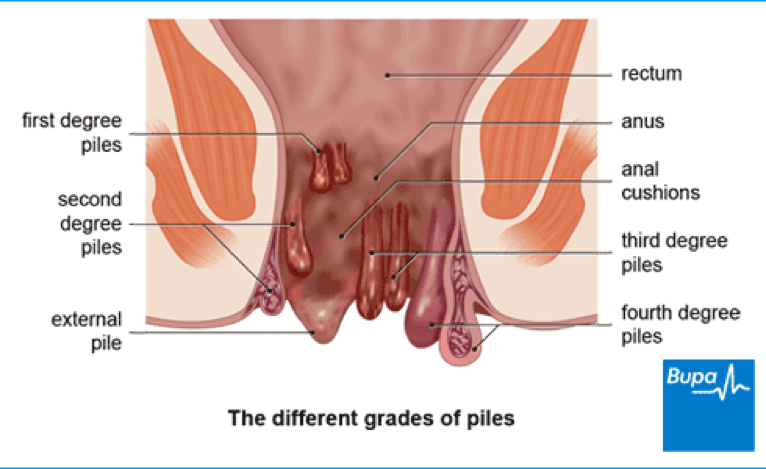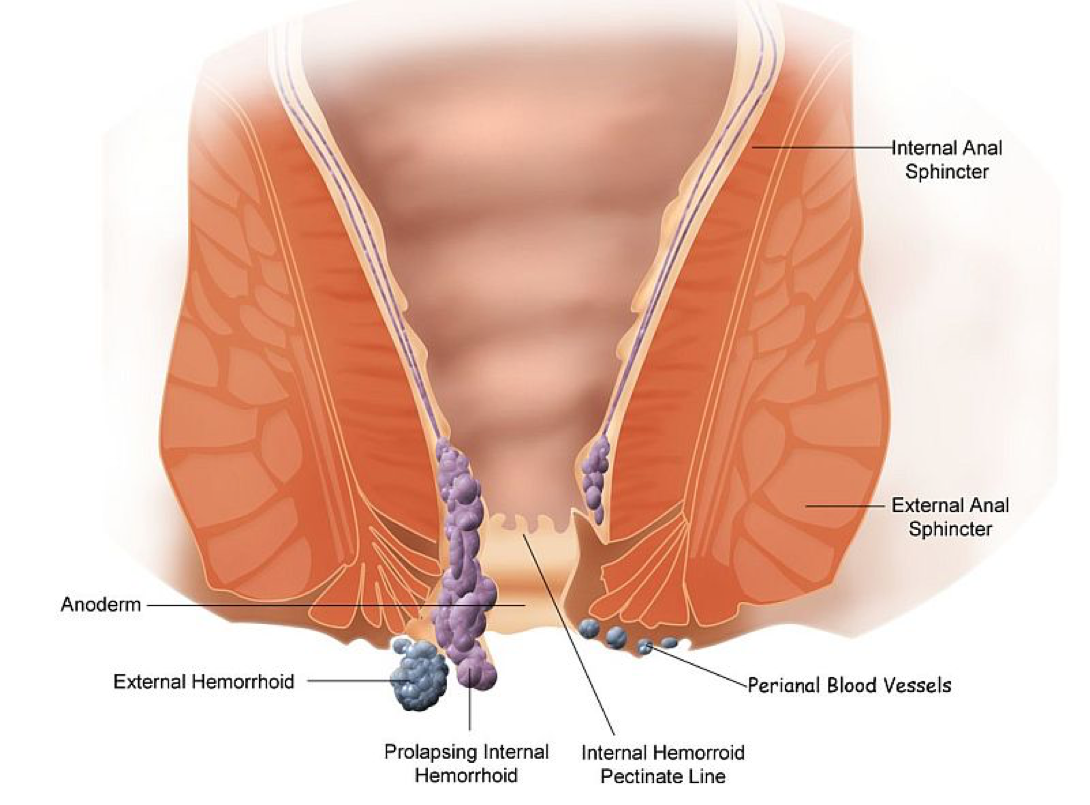Blog - Can Haemorrhoids be caused by Pregnancy
Can haemorrhoids be caused by Pregnancy?
Haemorrhoids, which are often known as piles, are a common but frustrating ailment. They often flare up in older people or during pregnancy, though anyone can get them at any time, and sometimes necessitate a visit to the doctor. If you’ve never had them before, you may be alarmed by the symptoms that accompany their appearance in your body. However, haemorrhoids are usually no cause for worry and can clear up on their own.

What are haemorrhoids?
Haemorrhoids are swellings that occur when blood vessels expand. They appear inside or around the bottom, in the rectum and the anus; they can manifest both externally and internally, and are graded based on whether or not they extend out of the anal canal, and by how far. They are classified as first, second, third, fourth, or external haemorrhoids (or piles), and normally increase in painfulness the further they extend.
Symptoms of haemorrhoids include itchiness, aches and pains, anal swelling, painful passing of faeces, mucus discharge, a lump protruding from the anus, and bleeding after passing stool.
Suffering from haemorrhoids becomes more likely as you get older. Being constipated or spending a lot of time straining on the toilet also increases your chances of getting them. Haemorrhoids can also occur during and after pregnancy, though they usually clear up after the baby arrives.
In this article, we’ll explore whether or not haemorrhoids are caused by pregnancy.
What usually causes haemorrhoids?
Haemorrhoids normally flare up when veins in the anal canal swell and become inflamed. This is most often caused by excessive strain when using the toilet (if you have ongoing diarrhoea or are constipated), which commonly results from a lack of fibre in the diet, though they can also occur as a result of attempts to lift very heavy items or because of a cough that won’t go away.
Haemorrhoids are also often caused by being overweight, having a history of them in the family, or by sitting down for extended time periods. However, pregnancy can also lead to an appearance of haemorrhoids due to a variety of factors.
Can pregnancy cause haemorrhoids?
Haemorrhoids are most common in pregnancy in the third trimester. During this time, the uterus (enlarged by the pregnancy) puts added pressure on veins, causing them to inflame. They are an itchy, inconvenient and often painful irritation for women during a time when their bodies are undergoing significant change. However, they are usually not a threat to the health of the baby, and don’t last long.
As your unborn baby grows, your uterus gets bigger and begins to press against your pelvis. This growth puts a lot of pressure on the veins near your anus and rectum, and these veins may become swollen and painful as a result.
During pregnancy, the body’s production of the hormone progesterone increases substantially, which can relax vein walls and make them more likely to swell – this can lead to the appearance of haemorrhoids in the anal canal. In addition, the overall volume of blood in the body also increases, which forces veins to enlarge in order to compensate.
During pregnancy, haemorrhoids are most often caused by bowel strain, additional pregnancy weight, extended periods sitting down, and constipation.

Constipation and haemorrhoids in pregnancy
A large percentage of women can experience constipation during the course of their pregnancy. This is usually attributed to the uterus (which has grown significantly in size) pressing against the bowels, placing undue pressure on the inferior vena cava, the vein which drains the other veins of the large intestine. Hormones associated with pregnancy also slow down the movement of food through the intestines and cause women to have slower bowel movements that are much more strained and less frequent than usual, leading to constipation. Iron supplements required during pregnancy can also contribute to it.
To ease constipation during pregnancy (and in doing so, lessen the chance of developing haemorrhoids), it’s a good idea to drink a good amount of fluid, particularly water, and consume plenty of fibre in your diet; fruits, vegetables and whole grains are a must – pears, berries, avocados, artichokes, broccoli, Brussels sprouts, lentils, beans, peas, seeds and nuts are great sources of fibre. Increased exercise and straining less when on the toilet are also helpful methods of easing constipation.
How to prevent haemorrhoids during pregnancy
You can reduce your chance of developing haemorrhoids during pregnancy through a handful of simple but effective actions.
First, avoid standing or sitting in one spot for too long. Take every opportunity to get up and walk around for a bit, especially if your job involves sitting for extended periods of time. Try lying on your side on the sofa when watching TV or when reading in bed to reduce pressure on veins in your rectum. And when you feel the need to use the toilet, go straight away as holding it in make constipation more likely.
Secondly, do daily exercises aimed at strengthening your pelvic floor muscles – this can help improve your rectal circulation, assisting in the avoidance of constipation. These exercises can be performed at home, at work, or anywhere you find yourself.
Finally, you can ask your doctor for a stool softener to help avoid constipation. Laxatives should be steered well clear of as they can stimulate uterine contractions and cause dehydration.
How to treat haemorrhoids during pregnancy
Though they will usually go away of their own accord, there are several simple ways to treat haemorrhoids at home, at least to reduce itchiness and discomfort.
If the area is swollen, try applying an ice pack several times a day to bring it down and make you less uncomfortable. You can also soak your rectal region in warm water throughout the day using a basin or a shallow bath.
It’s also crucial to keep your anus clean and dry during the day. Take care to clean the area immediately after every bowel movement. Baby wipes or moist paper towels are a better alternative in this instance to toilet paper, which can be rough.
You should always pat rather than wipe your rectal region after a bowel movement to avoid irritation; if the area does become itchy, use baking soda or products made with hazel to ease the sensation. Always speak to your doctor before applying anything, though.
Date posted - 05 July 2021
Author - The Rafaelo Team
Please complete the form below with your request and one of our team will be in touch.